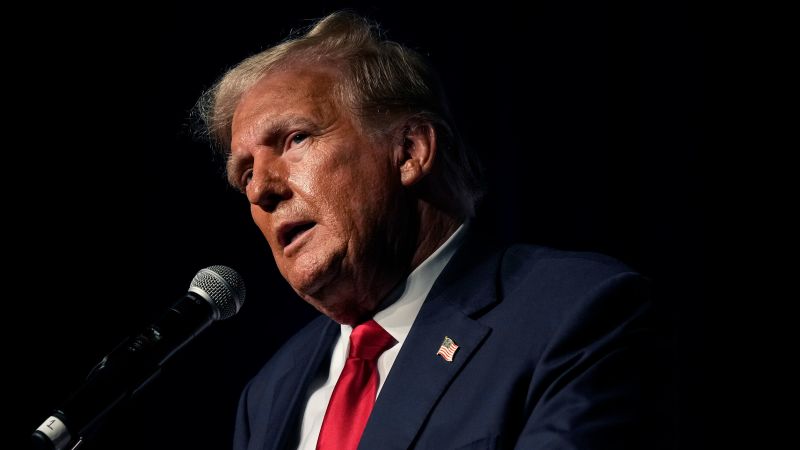Former President Donald Trump has lost the first of several attempts to throw out a lawsuit that seeks to block him from the 2024 presidential ballot in Colorado, based on the 14th Amendment’s prohibition against insurrectionists holding public office.
Colorado District Judge Sarah Wallace this week rejected Trump’s bid to get the lawsuit dismissed on free-speech grounds.
The former president still has several pending challenges against the case, which was initiated by a liberal government watchdog group.
I wonder if Trump will be jailed before the coming nuclear apocalypse.
Solid maybe
This is the best summary I could come up with:
Former President Donald Trump has lost the first of several attempts to throw out a lawsuit that seeks to block him from the 2024 presidential ballot in Colorado, based on the 14th Amendment’s prohibition against insurrectionists holding public office.
Colorado election officials say there’s a “hard deadline” to resolve the dispute before January 5, when the ballot printing process begins for the March 5 Republican primary.
A post-Civil War provision of the 14th Amendment says American officials who take an oath to uphold the Constitution are disqualified from future office if they “engaged in insurrection or rebellion” or if they have “given aid or comfort” to insurrectionists.
CREW’s chief counsel Donald Sherman said in a statement that the group is “pleased with the Court’s well-reasoned and very detailed order, leading to a thorough decision, and look forward to presenting our clients’ case at trial.”
However, Griswold has said in court filings that she “believes that Mr. Trump incited the insurrection” and therefore wants the judge to determine if the 14th Amendment’s insurrectionist ban can be applied through Colorado state law, because she has “sworn a solemn oath to uphold the U.S. Constitution and to effectuate its requirements.”
Legal scholars are also split on how the 14th Amendment could be applied to Trump and how the ban would be implemented – whether by state officials, Congress or a court – given the existing ambiguities in the law.
The original article contains 627 words, the summary contains 236 words. Saved 62%. I’m a bot and I’m open source!
Don’t see how this stands as he hasn’t been convicted of anything (yet!).
The 14th Amendment doesn’t require a conviction, and innocent until proven guilty doesn’t apply because this is a civil suit.
I’ll be surprised if this doesn’t go all the way to SCOTUS though.
… and innocent until proven guilty…
Just for further clarification… it’s not a factual innocence. In reality the line is ‘a presumption of innocence until proven guilty’- it’s a prescription for how one is to be treated (like an innocent person) during the process of proving that guilt in a criminal proceeding.
If one kills another without just cause, they are guilty of murder. It may or may not ever reach a court of law, and they may be acquitted, but they’re still guilty of murder. guilt is determined by the act (and the motive of the act,)
To follow your apt points: it is important to remember that “not guilty” and “innocent” are two different things.
That’s not how 14 amendment supposed to work. It doesn’t put him to jail, it just makes him ineligible to run for position in the government. There is a gateway for senate to override it and let the affected person to run.
Of course SCOTUS can change this and interpret it the way you are saying for partisan reasons, but there’s nothing implying that one has to be convicted of anything, only involved.
Of course SCOTUS can change this and interpret it the way you are saying for partisan reasons, but there’s nothing implying that one has to be convicted of anything, only involved.
Not really. the 14th is pretty explicit: if you participate in an insurrection, having taken an oath to defend this country, you are ineligible to hold further office in this country.
While I agree, it should be settled a court so due process is respected (also part of the 14th, incidentally,) … I’m perfectly okay with that process happening in a civilian court. as it’s happening in coloroado’s lawsuit, for example.
I mean, there’s video.
The pee tapes? I want them to be public yes.




